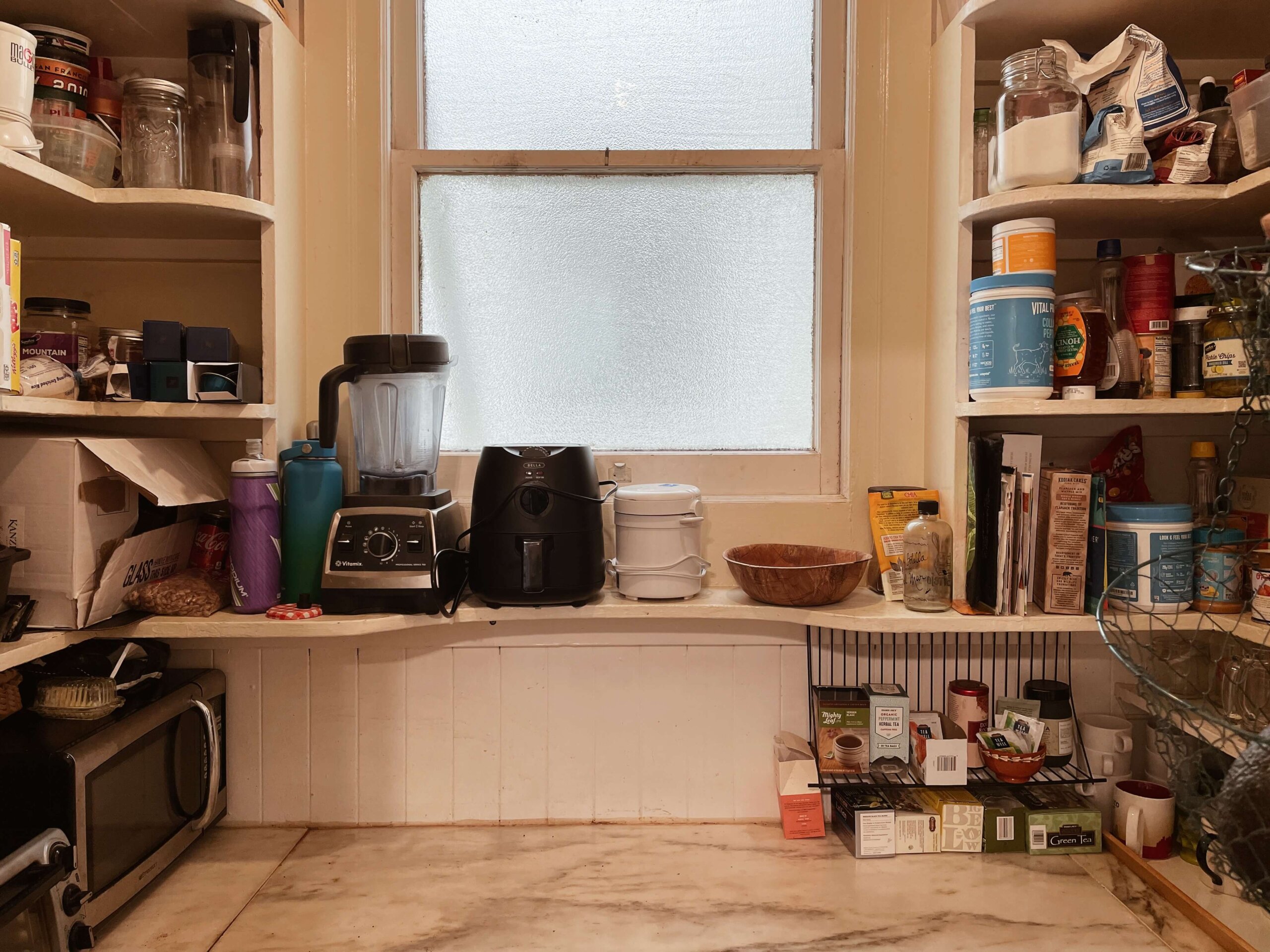She took me to an open mic night about death for our first date. I didn’t know if it was a friend date or a date-date, but I hoped it was the latter. It was 30 degrees Celsius in San Francisco that night—one of the two nights of the year where you can leave your house without a jacket and the air smells like jasmine.
I was nervous.
Because she was a woman and I liked her. Because I had only dated men. Because I didn’t want to be presumptuous. Because what if she liked me back? Because what if she didn’t?
Before I left to meet her, I drank a glass of wine out of a Mason jar in my pantry and noticed the uneven stacks of plates—the blue, the off-white, the chipped yellow ceramic stacks of practicality. I stood on one foot in the corner among the chocolate chips, the tin of spices a friend had brought back from India and the opened bag of chips from last weekend’s picnic.
There was a calming energy in this quiet, carved-out space of contemplation for my physical nourishment. And isn’t nourishment a vein of self-care? At the time, I lived in a house with five roommates. Next to the bathroom, the pantry was one of the rare places of solidarity.
It was where I went during an anxiety attack or a crying fit brought on by a just-missed train or the sudden death of a distant uncle. I never sat on the counter. I stood. I took my time, I slowed down. I loitered. I didn’t need to perform; I could just exist without judgment or expectation from the world and the people in it.
“There was a calming energy in this quiet, carved-out space of contemplation for my physical nourishment.”
There was no one else to consider among the food and dishes and bottles of wine—just me. Just me eating the cheese I had cut on the counter without a cutting board when I was feeling rebellious. Jack cheese. Pesto jack cheese. Mozzarella. I tried to cut the feta cheese too before I remembered its true nature, before I remembered the only thing it wanted was to be crumbled with a paw-like hand.
When I met her outside my apartment for our friend date, or date-date, the air was thick with heat despite the evening. I couldn’t stop looking at her during the open mic. We decided to leave the venue early and went to a dive bar with stale popcorn. It was there I got the courage, doled out like a scoop of ice cream, to tell her that I had a big crush on her. And she told me that she had a crush on me, too. It was a date-date.
Nine months later, we moved in together during the pandemic. We were in love and it made sense in the way that certain stacks of plates do. I thought of the good parts of our relationship that way: we had fun together (one plate), we both went to therapy (another plate, stacked a little precariously), we had similar life goals, liked camping and wanted a dog (one plate for each, the stack growing and growing). Yes, she was an introvert and I was an extrovert; she was a morning person and I liked staying up late. But these differences were the chips that gave the plates character. There were many more reasons to live together than not.

Credit: Courtesy Allyson Darling
When the pandemic began, I was living in a studio. She was living in a wooden-floored house with four queer women. We’d trade off staying a few nights in a row at each other’s homes, packing bags and planning ahead to drive across the bay while the ease of public transportation and spontaneity was on hiatus. No one was leaving their houses, no one was going to work. There was no traffic.
Combining separate lives into one is what living with a partner means. You join the contents of your pantries in holy matrimony: my mason jars of lentils and whole wheat pasta with slightly rusted lids were snuggled up against her half-empty bag of pistachios and cans of soup I would have never selected myself from the grocery store.
Living together means less alone time, more together time and the sharing of meals and chores and laughs in the early morning and deep night. Living together during a pandemic means even less alone time, even more together time, laughs, yes, but cries too. Lots of cries.
Sometimes we’d lay awake at night facing each other, heads on pillows, and talk about our fears. And sometimes it was too much. I found myself laid off from the tech company where my girlfriend still worked, and sometimes had a hard time escaping the dregs of comfort that our bed offered.
“During the pandemic, the pantry became especially a space of holding. A hug.”
I began coating myself in fear like butter. I needed a place to ground myself, a place of solitude, of familiarity, of predictability, of nourishment. I needed the pantry.
There’s something about a tidy pantry that makes you feel like you can match your insides to its contents. The chatter of your mind is organized like stacks of plates, like the rows of spices that when sniffed bring you back to your grandmother’s kitchen when you were seven. Organized, like the types of grain I’d purchased: farro (when trying to be healthy), macaroni and cheese (when trying to be fun), whole-grain pasta (when being sensible). A tidy pantry allows space to think about life and death and sickness and masks and Lysol and bleach while standing beside the hot chocolate from three Christmases ago that’s probably too old but you won’t throw out because your brother gave it to you in a more care-free and normal time. It’s a reminder that those times existed, and that they will exist again.
During the pandemic, the pantry became especially a space of holding. A hug. It’s a collection of the people who love you, represented by the forgotten-to-be-returned Tupperware that once held baked goods, the sentimental mugs, the salad spinner your grandmother bought you when you went to college and the bottle of absinthe your friends left one night, telling you to “keep it” after seeing your apartment with your new girlfriend for the first time.
These clatters of memories, old and new, all communicate the same thing: you will never get chastised for eating cheese here. You’ll never receive a look of dismay here. You are safe here. You will not be rejected. You are loved. You are accepted.


 Why you can trust Xtra
Why you can trust Xtra


